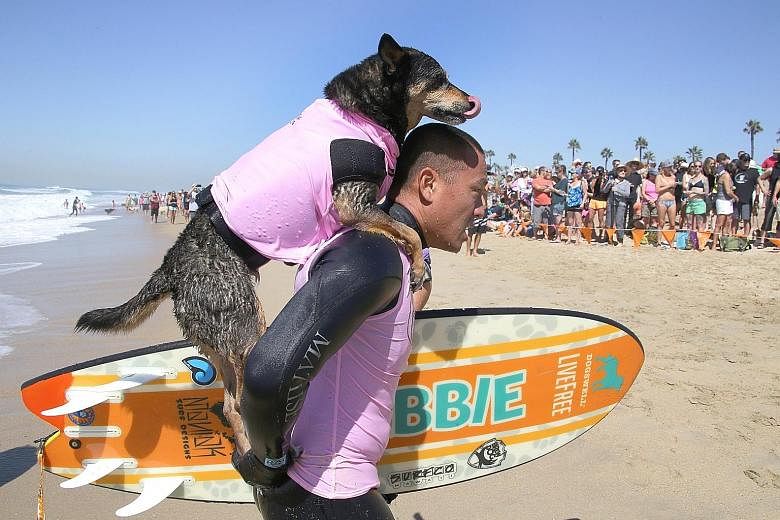PARIS • If you think dogs are drawn to your winning personality, then think again, because the attraction may be genetic, according to a new study.
Providing food and playing fetch, of course, also forges strong bonds. But experiments involving several hundred dogs, and a sweeping analysis of their genomes, uncovered genetic variants clearly linked to canines being friendly with humans.
The same genes, it turns out, help govern sociability in our species, and are implicated in neurological problems ranging from autism to attention deficit hyperactivity disorder.
"Our findings suggest there may be a common underlying genetic basis for social behaviour in dogs and humans," said the study's senior author, Professor Per Jensen. He is an expert in the science of animal behaviour, or ethology, at Linkoping University in Sweden. The study was released on Thursday.
The first domesticated dogs - about 15,000 years ago - were probably wolves that had grown accustomed to the presence of humans.
A number of Prof Jensen's experiments, for example, compared the behaviour of puppies and wolf pups raised as family pets.
When confronted as adults - in the presence of humans - with so-called "impossible tasks" that they could not resolve, the dogs and socialised wolves behaved differently.
"In general, dogs had a strong tendency to solicit human help", whereas wolves - even those raised as pets, did not, said Prof Jensen.
Prof Jensen and his colleagues performed a similar test with more than 400 beagles raised in a kennel that produced animals for laboratory tests. Importantly, all the animals came to maturity under the same conditions and with the same level of human contact.
In the experiments, each beagle tried to lift clear plastic lids off three bowls, in order to get an edible treat below.
The first two tests were easy, but the third lid was impossible to move. In particular, the researchers observed to what extent the dogs turned to a human, as if to seek assistance.
The next step was to examine the DNA coding of each dog's genome, to look for matches between its behaviour in the experiment and specific genetic variants, or mutations.
Prof Jensen and his team found five genes that correlated strongly with the dogs most inclined to seek human help - the same genes related to sociability in humans. The two that stood out the most are known as SEZ6L and ARVCF.
Prof Jensen is now sequencing the genes of wolves to see if they have the same variants. If not, it would strongly suggest that these "sociability genes" arose recently.
"My gut feeling is that there is the same kind of gene variations in the wolf population," Prof Jensen said.
AGENCE FRANCE-PRESSE

